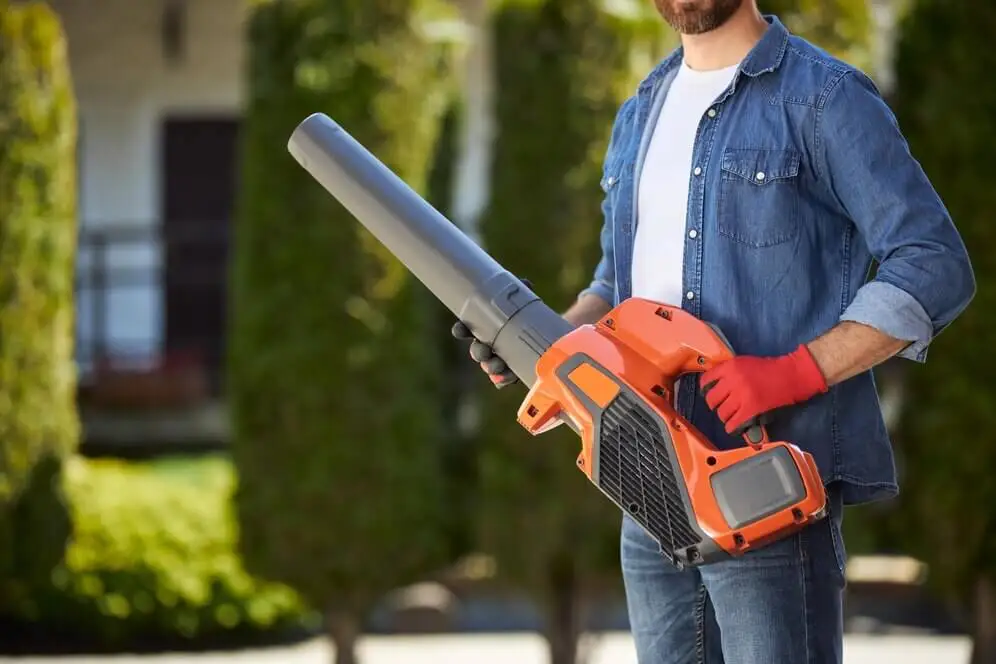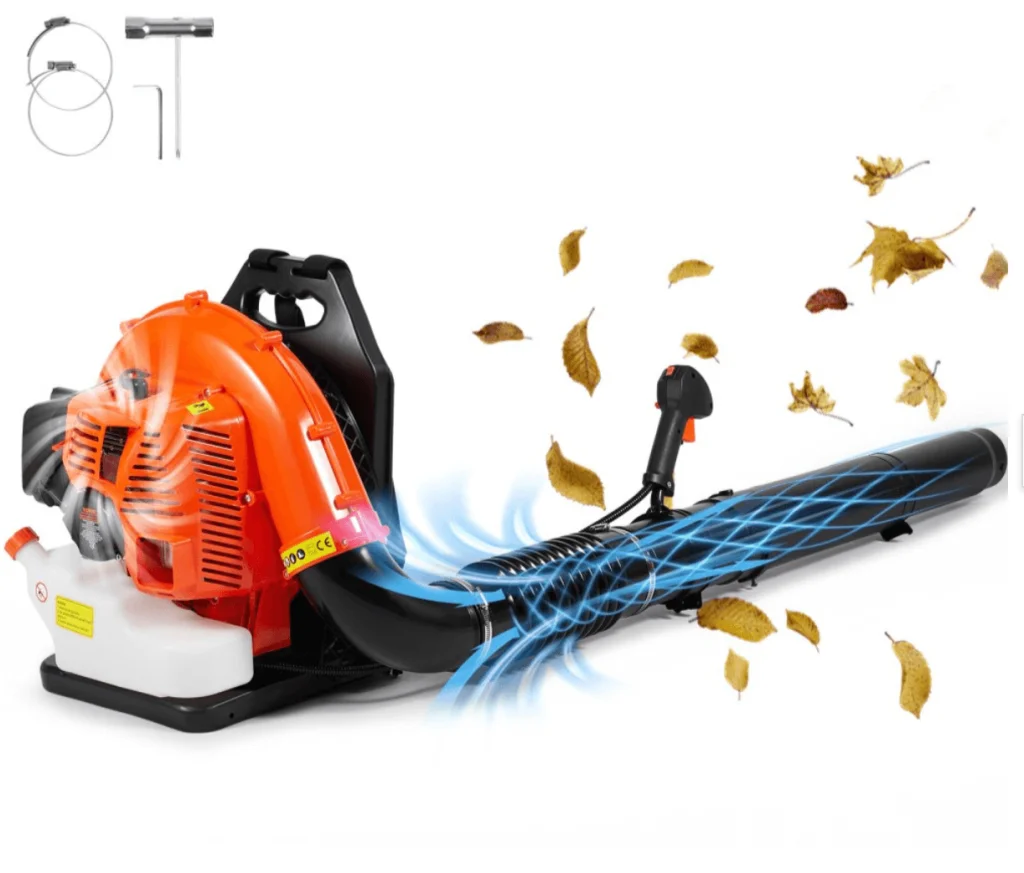Leaf blowers make yard work quick and easy. They help clear leaves, debris, and grass clippings fast. Choosing the right one can be tricky. Gas and electric leaf blowers are the main types. Each has its pros and cons.
Gas blowers are powerful but noisy and need fuel. Electric blowers are quieter and easier to use but need a power source. This guide will compare gas and electric leaf blowers. We’ll cover power, performance, ease of use, and environmental impact. By the end, you’ll know which blower is best for your garden.
Table of contents
- What is a Leaf Blower?
- Gas Leaf Blowers: Power and Performance
- Electric Leaf Blowers: Efficiency and Ease of Use
- Gas vs Electric Leaf Blower: Head-to-Head Comparison
- How to Choose the Right Leaf Blower for Your Needs
- Why Choose a VEVOR Leaf Blower?
- FAQs
- Summary: Gas vs Electric Leaf Blower – Final Verdict
What is a Leaf Blower?
A leaf blower is a gardening equipment designed to blow out leaves, clipping and any other extraneous matter in a landscaped area. The basic operation can be accomplished with a supply of either a gas engine or an electric motor. The compressed air is supplied through the nozzle in order to blow debris in a way that it can be easily collected.
This is due to the fact that they are manufactured in various sizes and power, and therefore people can be able to get their preferred blower depending on the size of their yard, and level of cleanliness desired. From the residential area lawns to the commercial complex, with the help of the leaf blower, it is easier to maintain the surroundings from getting dirty.
What Does a Leaf Blower Do?
A leaf blower is a gardening device intended to blow out leaves, clipping, and any other unwanted matter in the landscape.
The basic functionality involves feeding either a gas engine or an electric motor to blow air through a nozzle to blow debris so that it can be collected easily. This is because they are available in different sizes and power, making it possible for individuals to find their ideal blower depending on the size of their yard and the level of cleanliness required.
For everything, starting from residential areas lawns up to commercial complexes, the use of the leaf blower is ideal for maintaining the surroundings clean.
Types of Leaf Blowers: Gas and Electric
Leaf blowers come in two main types: gas-powered vehicles and electric-powered vehicles. Cylinder blowers are ideal, especially for big gardens and jobs that require a lot of energy.
Gas-powered blowers are among the most powerful and mobile blowers on the market. Electric leaf blowers are appreciated for their lightweight design. They are easy to use and environmentally friendly.
Gas Leaf Blowers: Power and Performance
What is a Gas Leaf Blower?
A gasoline engine powers gas leaf blowers. They are either two-stroke or four-stroke. These engines drive the fan that produces a strong airflow, making gas blowers highly effective in clearing large areas with thick layers of debris.
They’re especially popular among professional landscapers and homeowners because of their extensive gardens.
Advantages of Gas Leaf Blowers

Gas leaf blower is known for its intensity and efficiency, with an added advantage when working larger areas and with demanding workloads. They offer better maneuverability since they do not require wires or charging, making users move around freely without interference.
The provided power ranges are quite high for gas blowers, which makes these tools suitable for handling wet leaves, heavy debris as well as light snow. For such reasons, they are ideal for users who require the most power and efficiency in their yard work.
Disadvantages of Gas Leaf Blowers
However, the use of the gas leaf blowers has several disadvantages that are outlined below.
- They are usually loud; some produce noise levels that are still considered prohibited in residential districts. It can become a major problem for the user as well as for neighbors and others around.
- Another issue is maintenance because gas engines are known to need typical services such as oil changes, fuel blending, and replacement of spark plugs and other associated units.
- Moreover, gas blowers give a live emission which causes the pollution of the environment. It should be noted that noise, maintenance, and CO emission factors may discourage customers from selecting the gas models.
Electric Leaf Blowers: Efficiency and Ease of Use
What is an Electric Leaf Blower?
Electric leaf blowers utilize electric motors that are drawn from a power outlet through a cable or a rechargeable battery. Corded models have a constant power as long as there is a connection to the outlet, whereas the cordless models offer more freedom of movement but rely on battery charge.
Electrical blowers are normally lighter and easier to operate compared to the ones that use gas as their source of energy.
Advantages of Electric Leaf Blowers
Electric leaf blowers do not produce noise as compared to the other blowers, which will be more appropriate for areas that have restrictions on noise production. They have low maintenance compared to other machines because they do not have engines to be overhauled or fuel to be prepared.
Fuel efficiency is also another plus, since electric blowers emit no fumes and are environmentally friendly. Corded electric blowers provide nearly unlimited operation time and cordless electric blowers are easy to use and portable, which is perfect for small yards or spurts of clean-up.
Disadvantages of Electric Leaf Blowers
The main drawback of electric leaf blowers is their power limitation compared to gas models. Corded versions are restricted by the length of the power cord, which can limit mobility. Cordless models, while more portable, have limited battery life, requiring recharges during extended use.
Additionally, electric blowers may struggle with heavy debris or large areas, making them less suitable for demanding tasks. Users must consider these limitations when choosing an electric blower, especially for larger properties.
Gas vs Electric Leaf Blower: Head-to-Head Comparison
Power and Performance Comparison
As for the raw power, gas-powered leaf blowers are often considered to be more powerful than electric ones. Gas blowers produce more flow and volume rates, and that makes them suitable for blowing through large amounts of dense materials within a short time.
Electric blowers provide satisfactory results in rather satisfactory performance for light to moderate operations, particularly in confined yards. The only difference between the two of them is their size and capacity to handle debris; therefore, the choice between two kinds for the most part depends on the scale of the work and the kind of debris being removed.

Weight and Portability
Electric leaf blowers are comparatively lighter than the gas ones, hence making it easier to handle. This is most relevant especially regarding usage for long durations, where the additional weight can cause fatigue among the users.
While some models may have limitations of the length of the electric cord, newer models that are wireless have the added benefit of not requiring a large engine like gas models while still being easy to maneuver.
Gas blowers are somewhat heavier and do not have restrictions in mobility as much as the first type, so they may be more suitable for large unconfined areas.
Noise Levels
Gas leaf blowers are substantially more noisy than electric ones, about a decibel level, that goes way beyond the residential noise ordinances. This can actually be a significant disadvantage for users within the quiet regions or individuals who may not wish to disturb others at night.
Electric blowers are much quieter than the gas-powered counterparts and therefore preferred by those neighbors who don’t want to wake up to the sound of a noisy blower. The lower noise levels also mean better comfort for the user, especially in a long period of use.
Cost Comparison: Gas Leaf Blower vs Electric
The starting cost of the gas leaf blowers is slightly higher compared to the electric type of the blower. Furthermore, gas blowers also have recurrent costs such as fuel, and oil consumed in the process as well as the general maintenance costs.
Electric blowers, especially corded, are inexpensive when it comes to operational costs, mostly because they do not need much maintenance. Battery-operated electric blowers may come with the extra charges of battery replacement, but overall, these blower types prove to be more economical for long-term use as against gas blowers.
Environmental Impact
While using gas leaf blowers, the emissions are likely to put the quality of the air that is in the environment and hence the gas blowers are not as environmentally friendly as the electric ones.
While electric blowers may be slightly less powerful than other blowers, their advantage is that they do not emit any harm to the environment, which makes them environmentally friendly.
Electric blowers are effective as compared to other types of blowers with low energy consumption, which makes them eco-efficient if employed with the aid of solar energy among others. As can be observed, the eco-friendly consumers are able to benefit from the electric blowers.
How to Choose the Right Leaf Blower for Your Needs
Assessing Your Yard Size and Debris Volume
Another important criteria when selecting a leaf blower are the area of your yard and the amount of waste that has to be removed.
When using minimal debris on small to medium-sized yards, then the electric blower is ideal since it is easy to use.
However, if you have a big compound, or if you have to blow large chunks of matter like branches, or leaves, a gas blower will suffice.
Considering Budget and Long-Term Costs
Another crucial factor is the issue of budget. Even though gas blowers may be more powerful, they also cost more to purchase and maintain. Electric blowers in general and more specifically the corded types of electric blowers have been cheaper to purchase and operate.
It is also wise to factor in the long-term costs such as, fuel cost, costs of maintaining the battery, costs of replacing the battery, among others.
Factoring in Noise Restrictions and Environmental Concerns
If you reside in a quiet neighborhood or zone where there is a strict standard regarding noise pollution, then the electric leaf blower should work better.
Also, if the environmental effects are a matter of concern, then electric blower models are clearly the better choice since they do not emit any pollution and are energy-conserving.
Balancing Power with Convenience
Lastly, convenience means choosing what is more valuable: power or the ability to use the blower for a shorter period.
Gas blowers offer unbeaten power compared to their rival equipment but possess ugly vices of noise maintenance and are more of an environmental threat. Although these machines have less energy, they are easy to use, quiet in operations, and cheaper, and are suited for daily, small-yard tasks.
Recommended For Your Project
Why Choose a VEVOR Leaf Blower?
Overview of VEVOR Leaf Blowers
VEVOR has several models of strong and powerful leaf blowers suitable for amateurs and professionals in gardening and landscaping. Easy to use, VEVOR’s line of leaf blowers is constructed to cater to different tasks with optimum precision.
Key Features and Benefits of VEVOR Leaf Blowers

The VEVOR Backpack Leaf Blower features a 79CC 2-stroke engine that delivers an impressive 930 CFM airflow and 184 MPH speed, making it ideal for clearing wet leaves, sand, gravel, and even snow.
Ease of use is another highlight, with features like adjustable hose angles, a throttle for precise control, and a cruise control system for maintaining consistent power. The ergonomic backpack design has padded straps and a shock-absorption system. This ensures comfort during extended use. The blower comes with a comprehensive accessory kit.
Customer Reviews
Customers consistently rate VEVOR leaf blowers highly for their reliability and ease of use. Many users appreciate the balance between power and convenience and the excellent customer service provided by VEVOR. These positive reviews reflect the satisfaction of gardeners and landscapers who rely on VEVOR for their yard maintenance needs.
FAQs
Which is better, gas or electric leaf blower?
The better choice depends on your specific needs. Gas blowers offer more power for large areas and heavy debris, while electric blowers are quieter, easier to maintain, and more eco-friendly.
How do I maintain my leaf blower?
Regular maintenance for gas blowers includes checking the oil, spark plugs, and air filters and keeping the fuel clean. Electric blowers require less maintenance, mainly battery care and keeping the motor clean.
Are electric leaf blowers as powerful as gas ones?
Electric blowers can handle most light to moderate tasks. But they generally lack the power of gas blowers for heavy-duty work. However, they are more than sufficient for most residential uses.
Summary: Gas vs Electric Leaf Blower – Final Verdict
Choosing between gas and electric leaf blowers depends on your yard’s needs. Gas blowers are best for large areas with heavy debris. They are powerful and move easily. Electric blowers are quieter and need less maintenance. They are also better for the environment. They work well for regular yard care in small to medium-sized areas. Consider your yard size, debris type, and noise preference when making your choice.
Check out the effective blowers from VEVOR for your garden.





